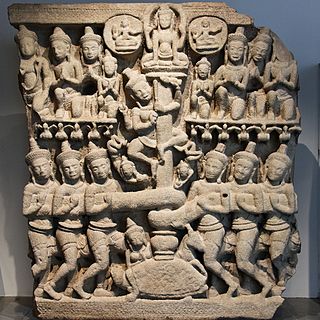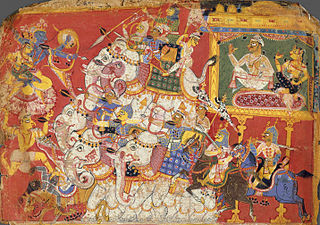Related Research Articles

Parashurama, also referred to as Rama Jamadagnya, Rama Bhargava and Virarama, is the sixth avatar among the Dashavatara of the preserver god Vishnu in Hinduism. He is destroyer of the evil on this planet. Shiva advised him to go and liberate the Mother Earth from felons, ill-behaved people, extremists, demons and those blind with pride. He is one of the Chiranjivis (Immortals), who will appear at the end of the Kali Yuga to be the guru of Vishnu's tenth and last incarnation, Kalki.

Kartavirya Arjuna was a king of an ancient Haihayas kingdom with capital at Mahishmati which is on the banks of Narmada River in the current state of Madhya Pradesh. Kartavirya was son of Kritavirya, king of the Haihayas. According to the Puranas, Haihaya was the grandson of Sahasrajit, son of Yadu(king) of Yadavas}. This is his patronymic, by which he is best known; he is also referred to simply as Arjuna. He is described as having a thousand hands and a great devotee of god Dattatreya.

Arjuna was an ancient prince of the Kuru Kingdom, located in the present-day India. He is one of the main protagonists of the Hindu epic Mahābhārata. He was the third of five Pandava brothers, from the lineage of the Kuru. In the Mahabharata War, Arjuna was a key warrior from the Pandava side in the battle of Kurukshetra. Before the beginning of the war, his mentor Krishna gave him the supreme knowledge of the Bhagavad Gita to overcome his moral dilemmas. In the epic, Arjuna is the closest friend and companion of Krishna.
Dilīpa, also known as Khaṭvāṅga or Khash, was a king of the Ikshvaku dynasty featured in Ramayana and Hinduism. Dilipa is the son of Mulaka and Ilibila, the husband of Sudakshina, and the father of Raghu. Dilipa is also the name of a serpent born into the Kashyapa family.

Meghanada, also referred to by his epithet Indrajita, according to Hindu texts, was the eldest son of Ravana and the crown prince of Lanka, who conquered Indraloka (Heaven). He is regarded as one of the greatest warriors in Hindu texts. He is a major character mentioned in the Indian epic Ramayana. Meghanada is the central character in Bengali epic poem Meghnad Badh Kavya. He played an active role in the great war between Rama and Ravana. He acquired many kinds of celestial weapons from his Guru Shukra. His most prominent feat is having defeated the devas in heaven. Using the Brahmastra, Indrajita killed 670 million vanaras in a single day; nearly exterminating the entirety of the vanara race. No warrior had ever achieved this statistical feat before in the Ramayana. He is the only warrior in the entire Ramayana to defeat both Rama and Lakshmana twice while they were both armed by making them unconscious in a battle with the help of astras and sorcery and finally got killed by Lakshmana. He was said to be more powerful and superior warrior than his father Ravana by Brahma and Agastya.

Karna, also known as Vasusena, Anga-Raja, Sutaputra and Radheya, is one of the major characters in the Hindu epic Mahābhārata. He is the son of Surya and princess Kunti. Kunti was granted the boon to bear a child with desired divine qualities from the gods and without much knowledge, Kunti invoked the sun god to confirm it if it was true indeed. Karna was secretly born to an unmarried Kunti in her teenage years, and fearing outrage and backlash from society over her premarital pregnancy, Kunti had to abandon the newly born Karna adrift in a basket on the Ganges. The basket is discovered floating on the Ganges River. He is adopted and raised by foster Suta parents named Radha and Adhiratha Nandana of the charioteer and poet profession working for king Dhritarashtra. Karna grows up to be an accomplished warrior of extraordinary abilities, a gifted speaker and becomes a loyal friend of Duryodhana. He is appointed the king of Anga (Bihar-Bengal) by Duryodhana. Karna joins the losing Duryodhana side of the Mahabharata war. He is a key antagonist who aims to kill Arjuna but dies in a battle with him during the Kurushetra war.

Vali also known as Bali, was a vanara and the king of Kishkindha in the Hindu epic Ramayana. He was the son of Indra, the husband of Tara, the elder brother of Sugriva, and the father of Angada through his wife, Tara.
The Brahmastra is an astra (weapon) that is one of the most destructive, powerful, and irresistible weapons mentioned in Hinduism. Only Parashurama, Rama, Meghanada, Bhishma, Drona, Karna, Ashwatthama, Arjuna, and Lakshmana possessed the knowledge to invoke this weapon. It was created by Brahma along with its more powerful variants Brahmashirā astra, Brahma danda, and Bhargavastra.

The Kurukshetra War, also called the Mahabharata War, is a war described in the Hindu epic poem Mahabharata, arising from a dynastic struggle between two groups of cousins, the Kauravas and the Pandavas, for the throne of Hastinapura. The war is used as the context for the dialogues of the Bhagavad Gita.

Hindu mythological wars are the wars described in the Hindu texts of ancient India. These wars depicted both mortals of great prowess as well as deities and supernatural beings, often wielding supernatural weapons of great power. Hindu teachings prescribe war as the final option, to be employed only after all peaceful methods are exhausted. Participation in righteous war, or dharmayuddha, was said to be honourable and was a principal duty of the Kshatriya or the warrior varna, and victory in such wars was regarded as a matter of honour.
The Pashupatastra an astra, a celestial missile, affiliated to the Hindu deity Shiva, as well as Kali and Adi Parashakti, which can be discharged by the mind, the eyes, words, or a bow.
Agneyastra is the signature celestial weapon (astra) of the Hindu god of fire, Agni, which is featured in Sanskrit epics like the Ramayana and Mahabharata, where it is invoked by many notable warrior-heroes such as Arjuna or Ashwatthama.

Parīkṣit was a Kuru king who reigned during the Middle Vedic period. Along with his son and successor, Janamejaya, he played a decisive role in the consolidation of the Kuru state, the arrangement of Vedic hymns into collections, and the development of the orthodox srauta ritual, transforming the Kuru realm into the dominant political and cultural center of northern Iron Age India. He also appears as a figure in later legends and traditions. According to the legendary accounts in Mahabharata and the Puranas, he succeeded his grand uncle Yudhishthira to the throne of Hastinapur.

In the Hindu epic Mahabharata, Babruvahana is the son of Arjuna, a Pandava prince, and Chitrangada, the princess of Manipura. Babruvahana was adopted as the heir of Manipura by his maternal grandfather, Chitravahana, and later reigned at the kingdom.

Bhagadatta was the son of Narakasura and grandson of Lord Shree Adivaraha, and the king of Pragjyotisha in Hindu mythology. Bhagadatta was born from a limb of the asura called Bashkala. He was a renowned warrior, and was known to be a great friend of Indra. When Arjuna embarked on a conquest to help his brother Yudhishthira perform the rajasuya yajna, Bhagadatta was one of the first kings to be conquered by him.
An astra is a supernatural weapon in Hindu epics. It is presided over by a specific deity and imbued with spiritual and occult powers. The term came to denote any weapon that was released from the hand, compared to holding it. The bearer of an astra is an astradhari.
In the Hindu epic Mahabharata, the Upapandavas, also known as Pandavaputras, Draupadeyas or Panchakumaras are the five sons of Queen Draupadi from each of the five Pandavas. They are Prativindhya, Sutasoma, Shrutakarma, Shatanika and Shrutasena. They were Maharathis, as mentioned by Bhishma, and fought the Kurukshetra war on the side of the Pandavas and slew many enemy warriors. They were as ferocious as their fathers but other than that, not much is said in the Mahabharata about the brothers. They were very strong and they were only defeated by remarkably few Kaurava warriors.

The Panchakanya is a group of five iconic women of the Hindu epics, extolled in a hymn and whose names are believed to dispel sin when recited. They are Ahalya, Draupadi, Kunti, Tara, and Mandodari. While Draupadi and Kunti are from the Mahabharata, Ahalya, Tara, and Mandodari are from the Ramayana. The Panchakanya are regarded to be ideal women who exemplify perfect wives in Hinduism.
dikshastra is a celestial weapon in Hindu mythology. Anjalikastra was a personal astra of the king of the devas, Indra. According to Hindu literature, using this weapon on an opponent decapitates them. In some stories, it is also said that Lakshmana - the brother of Rama - used same Anjalikastra to kill Indrajita. This astra is mentioned when Mahabharata's Arjuna used it to kill Karna.
References
- ↑ Gupta, Subhadra Sen (2001). Devi-devata: The Gods & Goddesses of India. Rupa & Company. p. 48. ISBN 978-81-7167-530-2.
- ↑ Sharma, Bulbul (2008-01-09). The Ramayana. Penguin Books India. p. 113. ISBN 978-0-14-333031-8.